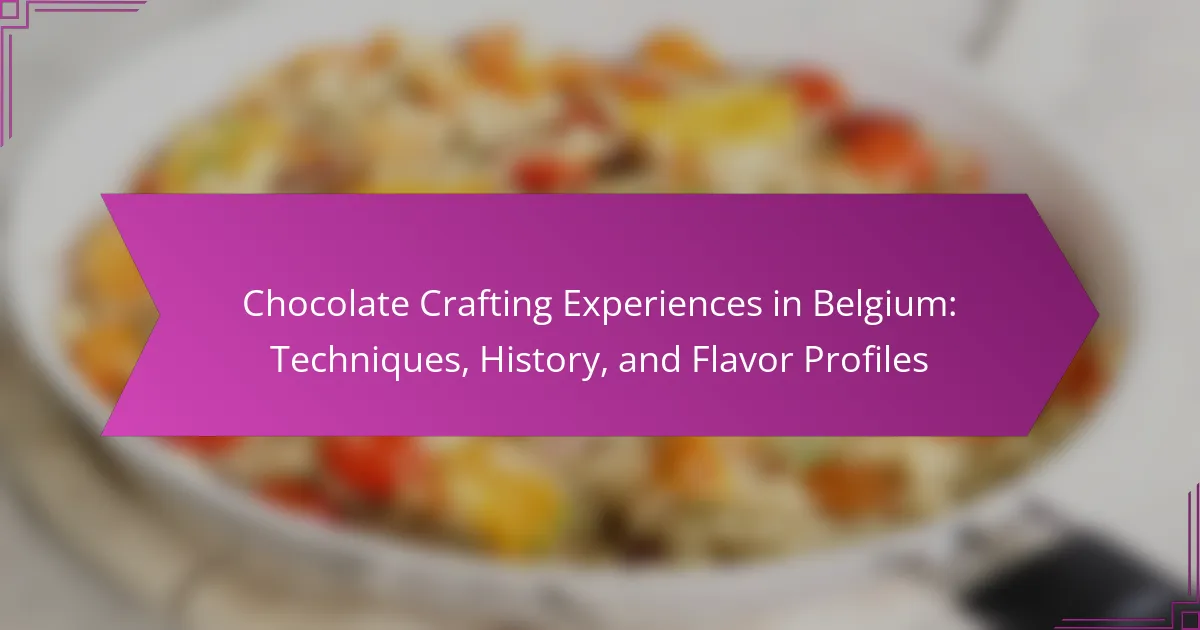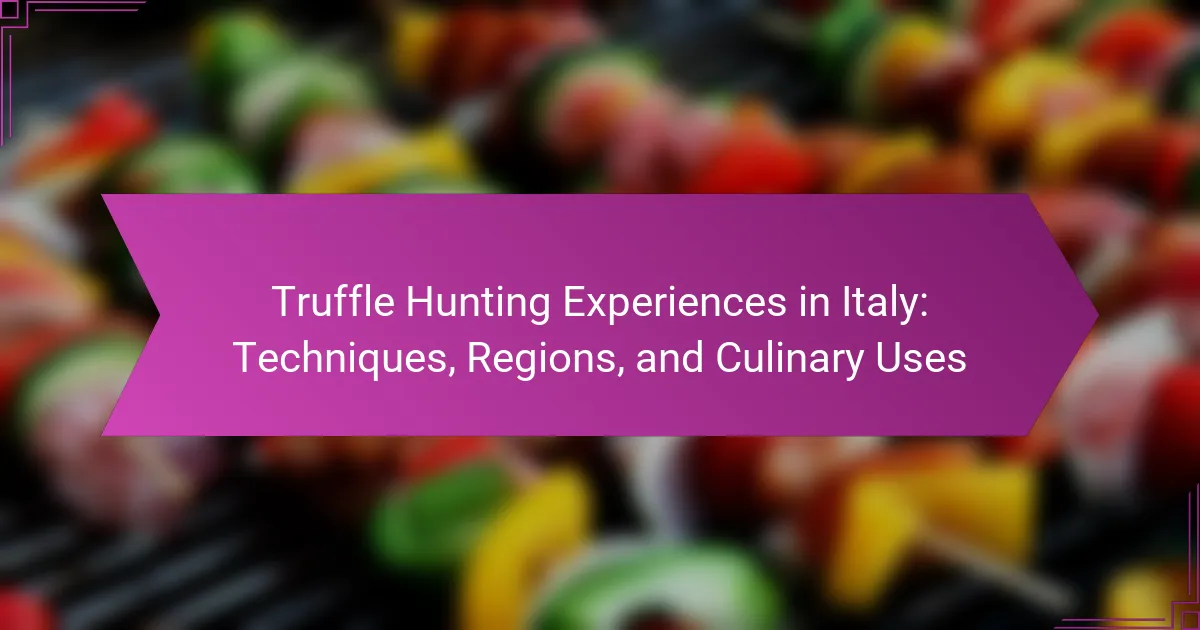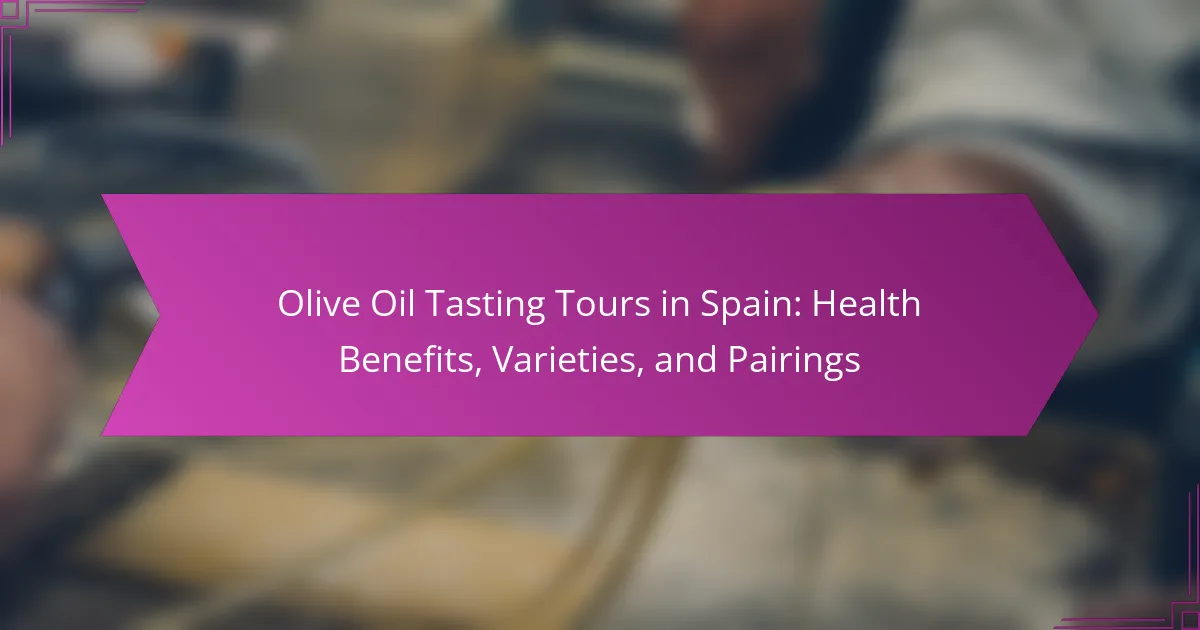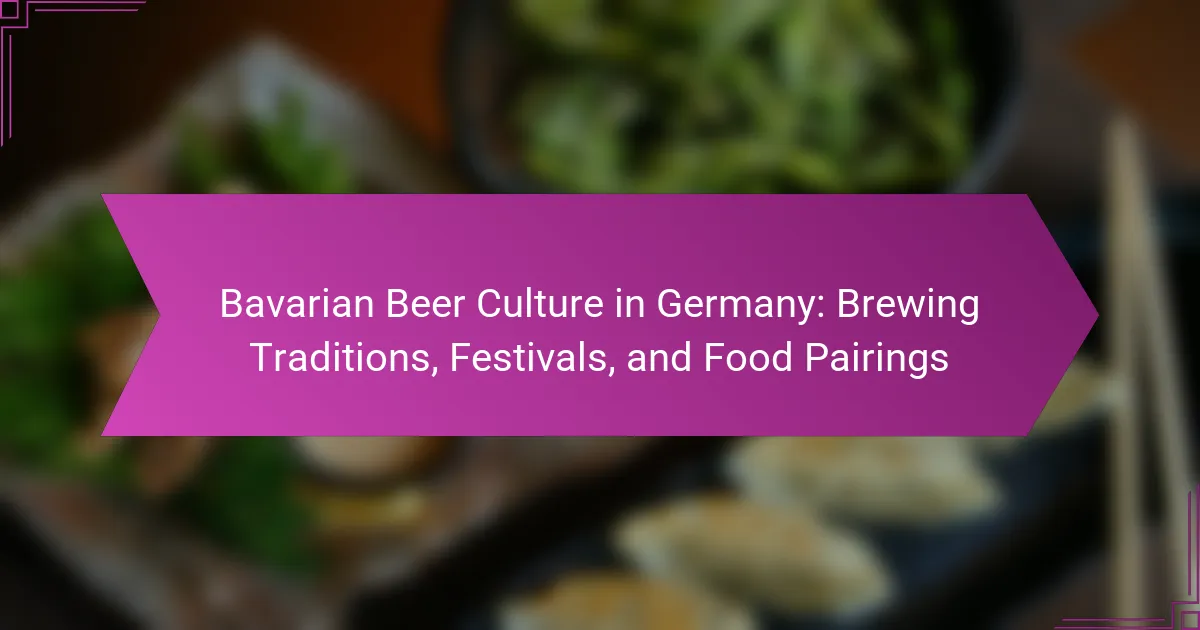Cheese-making workshops in France offer hands-on experiences that immerse participants in traditional methods and local culture. Attendees explore various cheese types, learn about unique attributes, and engage in tasting events. These workshops foster community connections while enhancing culinary skills and appreciation for artisanal cheese. Participants gain insights into flavor profiles, textures, and the craftsmanship behind each cheese.
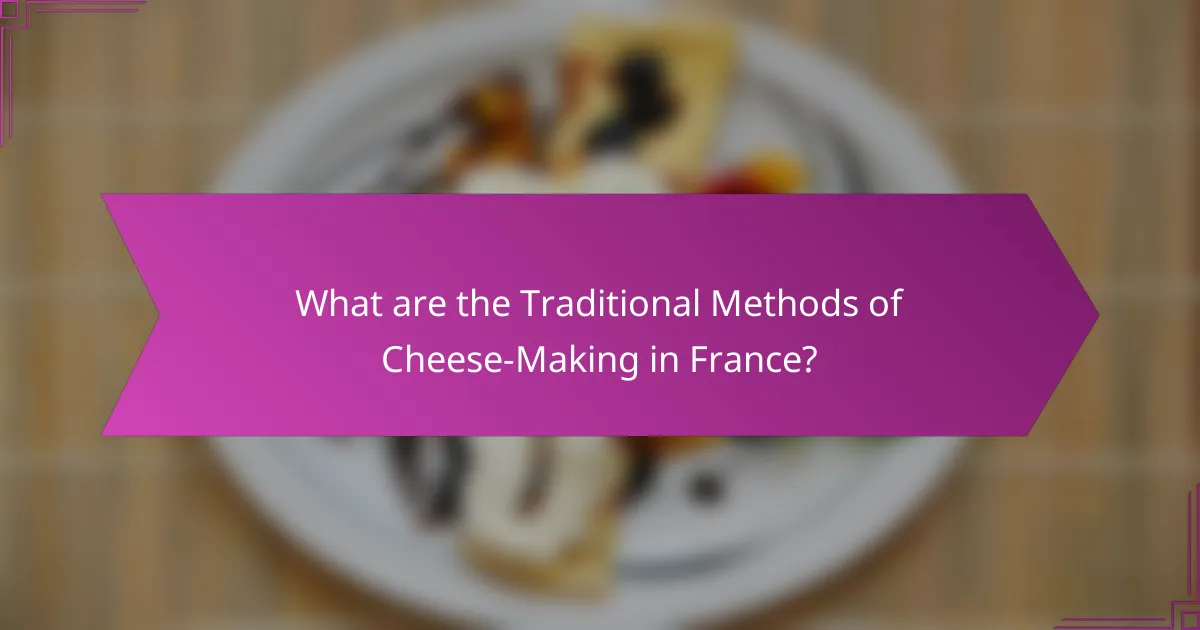
What are the Traditional Methods of Cheese-Making in France?
Traditional cheese-making methods in France include techniques like lactic fermentation, rennet coagulation, and aging. These methods vary by region, producing distinct cheese types such as Camembert, Roquefort, and Comté. Workshops often highlight these traditional practices through hands-on experiences and tastings. Participants learn about the unique attributes of each cheese, including flavor profiles and textures, enhancing their appreciation of French cheese culture.
How do Artisan Techniques Influence Flavor Profiles?
Artisan techniques significantly enhance flavor profiles in cheese-making. Traditional methods, such as specific cultures and aging processes, impart unique characteristics to cheeses. For instance, raw milk usage contributes to complex flavors, while aging in specific environments can develop distinct textures and aromas. These techniques create a diverse range of cheeses, each with its own flavor signature, reflecting regional ingredients and practices. Tasting events showcase these variations, allowing participants to appreciate the depth of flavors achieved through artisanal craftsmanship.
Which Regional Variations Exist in Cheese-Making Practices?
Regional variations in cheese-making practices are abundant across France. Each region employs distinct traditional methods that reflect local resources and culture. For instance, Normandy is known for its creamy Camembert, while the Alps produce robust cheeses like Reblochon. Tasting events often showcase these regional specialties, highlighting unique flavors and textures. Additionally, workshops frequently teach traditional techniques, such as the use of raw milk and aging processes specific to each area. These practices contribute to a rich tapestry of French cheese diversity, enhancing culinary experiences.
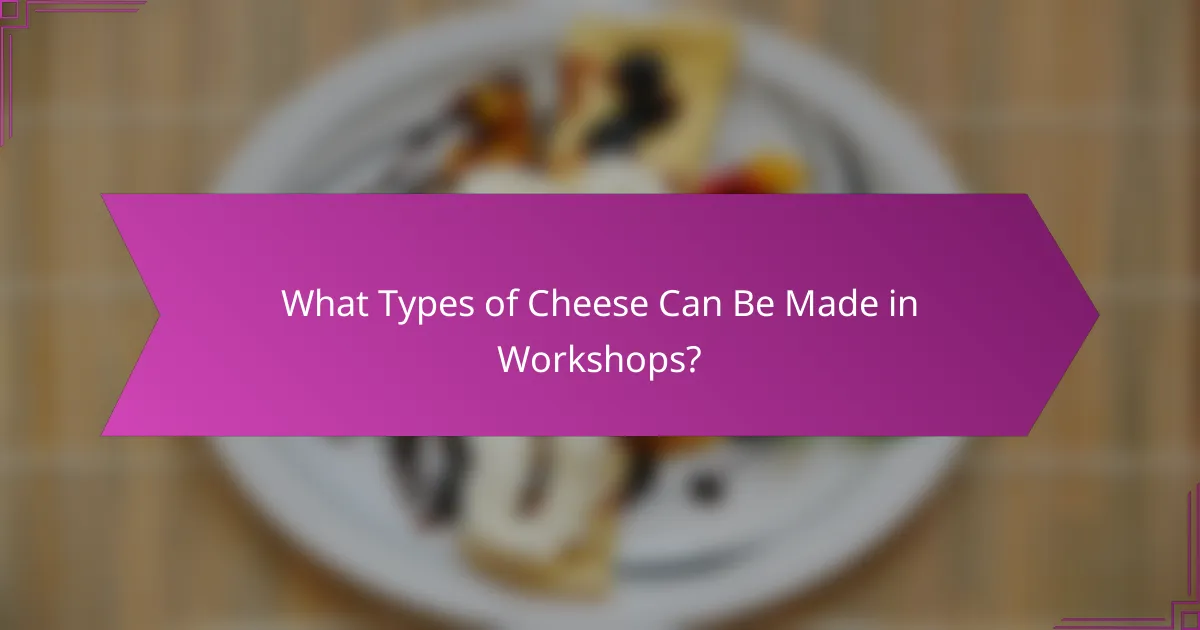
What Types of Cheese Can Be Made in Workshops?
Cheese-making workshops in France can produce various types of cheese, including Brie, Camembert, Roquefort, and Comté. Each cheese showcases unique characteristics and traditional methods. For example, Brie is known for its creamy texture, while Roquefort is distinguished by its blue veins and strong flavor. Workshops often include tasting events to enhance the experience.
How Does the Choice of Milk Affect Cheese Types?
The choice of milk significantly influences the types of cheese produced. Different milk sources, such as cow, goat, or sheep, impart unique flavors and textures. For example, cow’s milk often yields creamy cheeses like Brie, while goat’s milk is used for tangy varieties like Chèvre. The fat content and protein structure also affect the cheese-making process, impacting aging and flavor development. Workshops in France showcase these variations, emphasizing traditional methods that highlight the milk’s origin.
Which Cheese Varieties Are Most Popular Among Workshop Participants?
The most popular cheese varieties among workshop participants include Brie, Camembert, Roquefort, Comté, and Chevre. These cheeses are favored for their unique flavors and traditional production methods. Brie and Camembert are soft cheeses known for their creamy texture, while Roquefort offers a distinct blue flavor. Comté is appreciated for its nutty taste, and Chevre is favored for its tanginess. These varieties reflect the diverse cheese culture in France, enhancing the workshop experience.

What Can Participants Expect from Cheese-Tasting Events?
Participants can expect a delightful sensory experience at cheese-tasting events. These events offer a chance to sample various cheeses, learn about traditional French cheese-making methods, and appreciate the unique flavors of different types. Attendees often receive insights into the pairing of cheeses with wines and accompaniments, enhancing their tasting experience. Additionally, participants may engage with artisans, gaining knowledge about the craftsmanship behind each cheese, which adds depth to their appreciation.
How Are Tasting Events Structured to Enhance Learning?
Tasting events in cheese-making workshops are structured to maximize sensory learning and engagement. Participants experience various cheese types while learning about traditional methods and production processes.
The events typically include guided tastings, where experts explain flavor profiles, textures, and production techniques. This interactive format enhances retention and appreciation of cheese complexities.
Additionally, workshops may incorporate hands-on activities, allowing participants to create their own cheese. This unique attribute fosters a deeper understanding of the craft and its cultural significance.
Feedback sessions are often included, encouraging discussions about individual preferences and experiences. This rare attribute helps participants connect with each other and the cheese-making community.
What Pairings Are Recommended During Tasting Sessions?
Recommended pairings during cheese tasting sessions include complementary foods and beverages that enhance flavors. Pair cheeses with fruits like figs or grapes, which provide sweetness. Nuts such as almonds add crunch and richness. For beverages, consider wines; red wines pair well with aged cheeses, while white wines complement softer varieties. Craft beers also offer interesting contrasts. Lastly, artisan breads can serve as a neutral base, allowing the cheese flavors to shine.
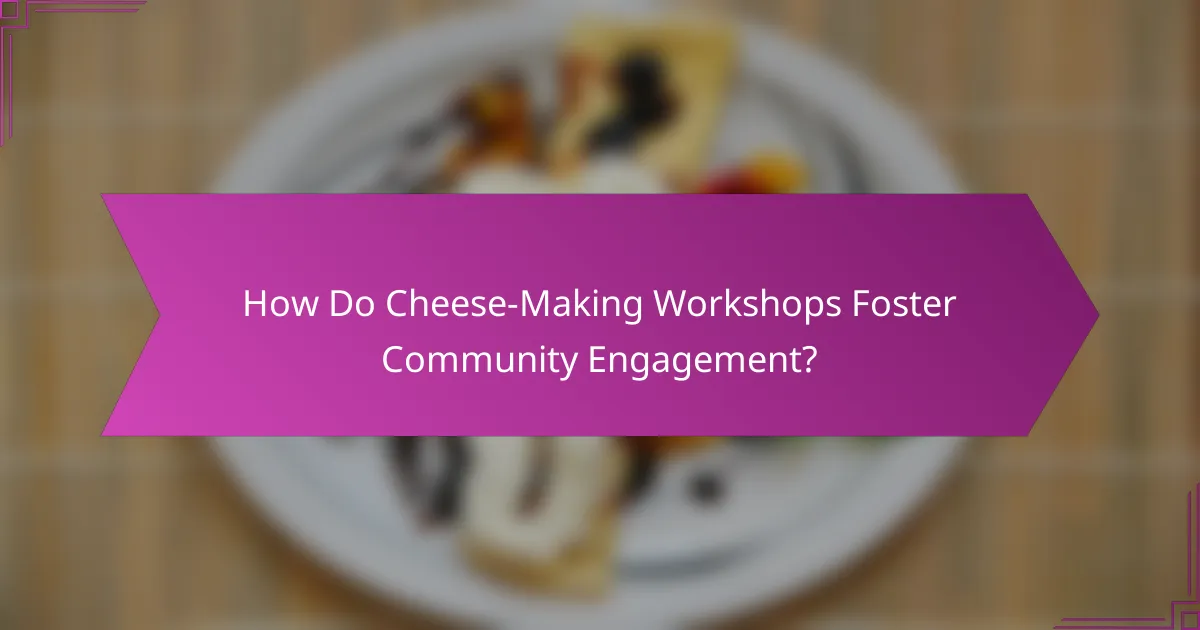
How Do Cheese-Making Workshops Foster Community Engagement?
Cheese-making workshops in France foster community engagement by bringing people together through shared experiences. Participants learn traditional methods, explore various cheese types, and enjoy tasting events, strengthening social bonds. These workshops create a sense of belonging and promote local culture. Engaging in hands-on activities encourages collaboration and communication, enhancing community ties.
What Role Do Local Producers Play in Workshops?
Local producers play a crucial role in cheese-making workshops in France by providing authentic ingredients and expertise. They enhance the experience through hands-on demonstrations of traditional methods. Their local knowledge ensures participants learn about regional cheese varieties, fostering appreciation for local culture. Additionally, they often lead tasting events, showcasing unique flavors that reflect the terroir. This connection to local producers enriches the educational aspect and supports sustainable practices in the cheese-making industry.
How Are Workshops Tailored to Different Skill Levels?
Cheese-making workshops in France are customized for different skill levels by offering varying techniques and complexity. Beginners learn basic methods, while advanced participants explore intricate processes and unique cheese types. Workshops may include hands-on practice, tastings, and expert guidance tailored to enhance each participant’s experience.

What Are the Benefits of Attending Cheese-Making Workshops?
Attending cheese-making workshops offers numerous benefits, including hands-on experience, cultural immersion, and enhanced culinary skills. Participants learn traditional methods, which deepen their appreciation for artisanal cheese. Workshops often include tastings, allowing attendees to explore various cheese types and flavors. This experience fosters a connection to local food culture, promoting sustainable practices.
How Do Workshops Promote Sustainable Practices?
Cheese-making workshops in France promote sustainable practices by emphasizing traditional methods and local ingredients. Participants learn to appreciate artisanal techniques that minimize environmental impact. These workshops often source milk from nearby farms, supporting local economies and reducing carbon footprints. Additionally, they encourage the use of seasonal and organic products, fostering a deeper connection to sustainable agriculture.
What Skills Can Participants Expect to Gain?
Participants can expect to gain essential cheese-making skills, including traditional techniques, flavor development, and tasting expertise. They will learn about various cheese types and the cultural significance of cheese-making in France. Additionally, hands-on experience will enhance their practical skills and deepen their appreciation for artisanal methods. Participants will also acquire knowledge of pairing cheeses with wines and other foods, enriching their culinary repertoire.

How Can Participants Maximize Their Experience in Workshops?
Participants can maximize their experience in cheese-making workshops by engaging actively, asking questions, and practicing techniques. Understanding traditional methods enhances appreciation for the craft.
Choosing workshops that offer various types of cheese, such as soft, hard, and blue, provides a broader learning experience. Participating in tasting events allows for direct comparison of flavors and textures, enriching the overall experience.
Networking with instructors and fellow participants fosters a sense of community and shared passion for cheese-making. Documenting the process through notes or photos can serve as a valuable reference for future endeavors.
What Should Be Considered When Choosing a Workshop?
When choosing a cheese-making workshop in France, consider the workshop’s focus on traditional methods, types of cheese offered, and tasting events. Look for workshops that highlight regional specialties, such as Camembert or Roquefort, to enhance your experience. Evaluate the duration of the sessions, typically ranging from a few hours to multiple days, to fit your schedule. Additionally, check participant reviews for insights into the instructor’s expertise and the quality of the materials used.
Which Common Mistakes Should Be Avoided During the Process?
Avoiding common mistakes in cheese-making workshops enhances the learning experience. Key mistakes include neglecting hygiene, overlooking temperature control, using incorrect milk types, and skipping the aging process.
1. Neglecting hygiene can introduce unwanted bacteria, affecting cheese quality.
2. Overlooking temperature control may result in improper fermentation.
3. Using incorrect milk types can lead to unexpected flavors and textures.
4. Skipping the aging process can prevent the development of complex flavors.
